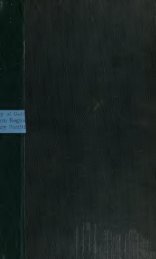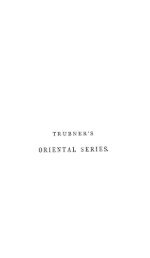Untitled
Untitled
Untitled
Create successful ePaper yourself
Turn your PDF publications into a flip-book with our unique Google optimized e-Paper software.
76 FOURTH DISCOURSE. ON PHYSICIANS<br />
*<br />
*lr<br />
[kxcursus.]<br />
.<br />
The physician should be of tender disposition and wise<br />
nature, excelling, in acumen, this being a nimbleness of mind in<br />
. forming correct views, that is to say a r#pid transition to the<br />
unknown from the known. And no physician can be of tender<br />
of the human<br />
disposition if he fails to recognize the nobility<br />
nor of wise nature unless he is acquainted with Logic, nor<br />
soul ;<br />
can .he excel in acumen unless he be strengthened by God's aid ;<br />
and he who is not acute- in conjecture will not arrive at a correct<br />
for he must derive his indications<br />
understanding of any ailment,<br />
from the pulse, which has a systole,- a diastole, and a pause<br />
intervening between these two movements 1 .<br />
Now here there is a difference of ,opinion amongst physicians,<br />
one school -maintaining that it is impossible by palpation to<br />
gauge the movement of contraction; but that most accomplished<br />
of the moderns, that Proof of the Truth Abu 'All al-Husayn ibn<br />
2<br />
'Abdu'llah ibn Sina (Avicenna) , says in his book the Qdntin 3<br />
,<br />
that the movement of contraction also can be gauged, though<br />
with difficulty, in thin subjects. Moreover the pulse is of ten<br />
sorts, each of which is divided into three subordinate varieties,<br />
namely its two extremes and its mean ; but, unless the Divine<br />
guidance assist the physician in his search for the truth, his<br />
thought will not hit the mark. So also in the inspection of the<br />
urine, the observing of its colours and sediments, and the deducing<br />
*>f some special condition from each colour (i^) are no easy<br />
matters ; for all these indications depend on Divine help and<br />
Royal patronage. This quality [of discernment]<br />
'<br />
/<br />
is that which we<br />
have indicated under the name of acumen. And unless the<br />
*.<br />
f<br />
physician knows Logic, and understands the meaning of genus<br />
and species, he cannot discriminate between that which appertains<br />
to the category, that which is peculiar to the individual, and that<br />
which is accidental, and so will not recognize t,he cause [of the<br />
disease]. And, failing to recognize the cause, he cannot succeed in<br />
his treatment. But let us now give an illustration, so that it may<br />
be known that it is as we say. Disease is the genus ; fever, headache,<br />
cold, delirium, measles and jaundice are the species, each of<br />
which is distinguished from the others by a diagnostic sign, and in<br />
turn itself constitutes a genus. For example, "Fever" is the genus,<br />
wherein quotidian, tertian, double tertian and quartan are the<br />
1 Some notes on the varieties of pulse recognized by the Arabian physicikns will<br />
be found in Note XXVI at the end.<br />
a See de Slane's translation of Ibn Khallikdn, vol. i, pp. 440-446^ von Kremer's<br />
Culfyirgeschichte d. Orients, vol. ii, pp. 455-456 ; Wustenfeld's Gesch. d. *~Arab,<br />
Aerzte, pp. 64-75; and Note XXVII, No. 10, at the end.<br />
3 The Qdmin was printed at Rome, A.D. 1593, and the Latin translation at Venice<br />
in A.D. 1544. According to^Steinschneider, Gerard of Cremona's Latin translation<br />
was printed more than thirty times, and fifteen times before A.D. 1500.<br />
1








![La religione di Zarathustra nella storia religiosa dell' Iran [microform]..](https://img.yumpu.com/15970820/1/151x260/la-religione-di-zarathustra-nella-storia-religiosa-dell-iran-microform.jpg?quality=85)


